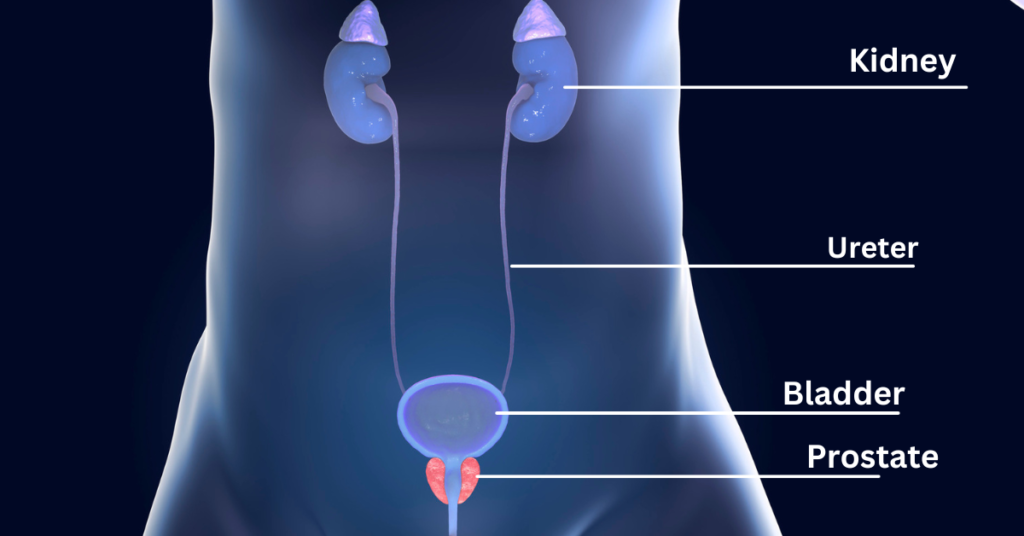The prostate is a small gland that is part of the male reproductive system. It produces a fluid that helps carry sperm during ejaculation. The prostate is located below the bladder and in front of the rectum, and it surrounds the urethra, the tube that carries urine and semen out of the body.

The prostate can be affected by various conditions, such as infection, inflammation, enlargement, and cancer. These conditions can cause symptoms such as difficulty urinating, weak urine stream, frequent urination, pain or burning with urination, blood in urine or semen, erectile dysfunction, and pelvic pain. Some of these conditions can also increase the risk of serious complications, such as urinary tract infections, bladder stones, kidney damage, and spread of cancer to other organs.
Fortunately, many prostate problems can be prevented or treated if detected early and managed effectively. Here are some tips on how to keep your prostate healthy and reduce your risk of prostate disease.
Get screened for prostate cancer
Prostate cancer is the second most common cancer among men worldwide, and the sixth leading cause of cancer death in men. Prostate cancer usually grows slowly and does not cause any symptoms in the early stages, but it can become aggressive and spread to other parts of the body if left untreated. Therefore, it is important to get screened for prostate cancer regularly, especially if you are over 50 years old, have a family history of prostate cancer, or belong to a high-risk ethnic group, such as African American or Caribbean men.
Screening for prostate cancer involves a blood test called prostate-specific antigen (PSA) test, which measures the level of a protein produced by the prostate. A high PSA level may indicate the presence of prostate cancer or other prostate conditions, such as benign prostatic hyperplasia (BPH) or prostatitis. However, the PSA test is not very accurate and can give false-positive or false-negative results. Therefore, if your PSA level is abnormal, you may need further tests, such as a digital rectal exam (DRE), a biopsy, or an imaging test, to confirm the diagnosis of prostate cancer.
The benefits and harms of prostate cancer screening are controversial, and different medical organizations have different recommendations on when and how often to get screened. Some experts suggest that screening may reduce the risk of dying from prostate cancer, while others argue that screening may lead to overdiagnosis and overtreatment of prostate cancers that would not cause any harm if left alone. Therefore, you should talk to your doctor about the pros and cons of prostate cancer screening and decide together if it is right for you.
Treat prostate enlargement
Prostate enlargement, also known as benign prostatic hyperplasia (BPH), is a very common condition that affects about half of men over 50 years old and almost all men over 80 years old. BPH occurs when the prostate grows larger and squeezes the urethra, causing urinary problems, such as difficulty starting or stopping urination, weak or interrupted urine flow, frequent or urgent urination, incomplete bladder emptying, and nocturia (waking up at night to urinate).
BPH is not a cancer and does not increase the risk of developing prostate cancer, but it can affect your quality of life and lead to complications, such as urinary tract infections, bladder stones, kidney damage, and urinary retention (inability to urinate). Therefore, if you have symptoms of BPH, you should see your doctor and get treated.
Treatment options for BPH include medications, minimally invasive procedures, and surgery. Medications, such as alpha-blockers and 5-alpha-reductase inhibitors, can help relax the muscles around the prostate and shrink the prostate size, respectively, and improve the urine flow and reduce the symptoms. However, medications may have side effects, such as dizziness, headache, sexual dysfunction, and breast enlargement or tenderness.
Minimally invasive procedures, such as transurethral microwave therapy (TUMT), transurethral needle ablation (TUNA), water vapor therapy (Rezum), and prostate artery embolization (PAE), can use heat, radio waves, water vapor, or tiny particles to destroy or block the excess prostate tissue and relieve the pressure on the urethra. These procedures are usually done in an outpatient setting and have fewer risks and faster recovery than surgery. However, they may not be as effective or durable as surgery, and they may cause temporary or permanent side effects, such as bleeding, infection, urinary retention, or sexual dysfunction.
Surgery, such as transurethral resection of the prostate (TURP), transurethral incision of the prostate (TUIP), laser surgery, or simple prostatectomy, can remove or cut the excess prostate tissue and create a larger opening for the urine to pass through. Surgery is usually reserved for men with severe symptoms or complications of BPH, or who do not respond to medications or minimally invasive procedures. Surgery is the most effective and long-lasting treatment for BPH, but it also has the highest risks and the longest recovery time. Possible complications of surgery include bleeding, infection, urinary incontinence, retrograde ejaculation (semen going into the bladder instead of out of the penis), or erectile dysfunction.
The choice of treatment for BPH depends on several factors, such as the severity of your symptoms, the size and shape of your prostate, your age and health condition, your preference and expectations, and the availability and cost of the treatment. You should discuss with your doctor the benefits and risks of each treatment option and choose the one that suits you best.
Prevent prostatitis
Prostatitis is an inflammation or infection of the prostate that can cause pain, swelling, and discomfort in the pelvic area, lower back, or genitals. It can also cause urinary problems, such as burning or painful urination, frequent or urgent urination, difficulty urinating, or blood in urine or semen. Prostatitis can affect men of any age, but it is more common in young and middle-aged men.
There are four types of prostatitis: acute bacterial prostatitis, chronic bacterial prostatitis, chronic prostatitis/chronic pelvic pain syndrome (CP/CPPS), and asymptomatic inflammatory prostatitis. Acute bacterial prostatitis is caused by a sudden infection of the prostate by bacteria, such as E. coli, that enter the prostate from the urinary tract or the rectum. It is a serious condition that requires immediate medical attention, as it can cause fever, chills, nausea, vomiting, and urinary retention. It is treated with antibiotics and pain relievers.
Chronic bacterial prostatitis is caused by a persistent or recurrent infection of the prostate by bacteria, usually the same ones that cause acute bacterial prostatitis. It is a less severe but more difficult to treat condition, as it can cause recurrent urinary tract infections, chronic pelvic pain, and sexual dysfunction. It is treated with long-term antibiotics and pain relievers, but it may recur or become resistant to antibiotics.
CP/CPPS is the most common and least understood type of prostatitis. It is not caused by a bacterial infection, but by other factors, such as nerve damage, muscle tension, stress, or immune system disorders. It is characterized by chronic pelvic pain that may vary in intensity and location, and may be accompanied by urinary or sexual problems. It is diagnosed by ruling out other causes of pelvic pain, such as urinary tract infections, kidney stones, or prostate cancer. It is treated with a combination of medications, such as alpha-blockers, anti-inflammatories, antidepressants, or muscle relaxants, and non-pharmacological therapies, such as physical therapy, biofeedback, acupuncture, or lifestyle changes.
Asymptomatic inflammatory prostatitis is a condition in which the prostate is inflamed but does not cause any symptoms. It is usually detected incidentally during tests for other conditions, such as infertility or prostate cancer. It does not require any treatment, unless it affects the fertility or the PSA level.
The exact causes of prostatitis are not fully known, but some factors that may increase the risk of prostatitis include:
- Having a urinary tract infection or a sexually transmitted infection
- Having a history of prostatitis or pelvic trauma
- Having an enlarged prostate or a urethral stricture
- Having a weak immune system or a chronic health condition, such as diabetes or HIV
- Having unprotected sex or multiple sexual partners
- Having a stressful or sedentary lifestyle
- Using a urinary catheter or having a prostate biopsy
To prevent prostatitis, you should:
- Drink plenty of fluids and urinate regularly to flush out the bacteria from the urinary tract
- Practice good hygiene and avoid irritants, such as spicy foods, alcohol, or caffeine, that may irritate the prostate
- Use condoms and limit your number of sexual partners to prevent sexually transmitted infections
- Seek medical help if you have symptoms of a urinary tract infection or a sexually transmitted infection
- Avoid prolonged sitting or cycling, or use a cushion or a padded seat to reduce the pressure on the prostate.
- Do pelvic floor exercises or yoga to strengthen the pelvic muscles and improve the blood flow to the prostate
- Manage your stress and relax your mind and body with meditation, breathing exercises, or massage
- Eat a healthy diet rich in fruits, vegetables, whole grains, and lean proteins, and low in fat, sugar, and salt, to boost your immune system and reduce inflammation
- Take supplements, such as zinc, selenium, vitamin E.

In conclusion, the prostate is an organ in the body that must be deliberately taken care off. You should evaluate yourself if you have any of the symptoms mentioned and seek medical care urgently to avert complications. The information given here is advisory and cannot replace the expert consultation and advice of your doctor. Therefore, seek help today from qualified medical personnel if you are concerned about your prostate.

